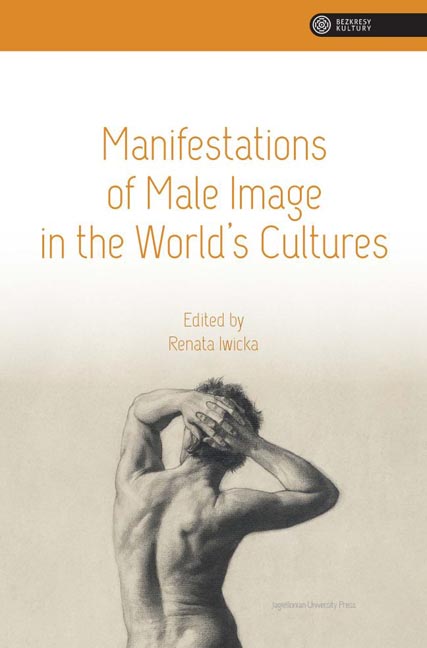Book contents
- Frontmatter
- Contents
- Preface
- “A Jewel Beyond Compare”: Prince Hikaru Genji As A Perfect Male Of The Heian Period In The Light Of Popular Culture Theories
- Cicero and Male Virtue
- Kill The Savage, Save The Man – James Welch’s Chronicle Of Native American History
- On (Self-)Representations Of Masculinity In Siyāmak Herawi’s Short Stories
- Power, Masculinity, And War: Superman, A Case Study
- Redefining New Masculinity In Korean Television Drama Series
- Stripping The Vampire. Erotic Imaginations and Sexual Fantasies In Paranormal Romances (A Study Of Selected Examples)
- The Horned God: Divine Male Principle In British Traditional Wicca
- Biographical Notes of the Authors
- Miscellaneous Endmatter
Redefining New Masculinity In Korean Television Drama Series
Published online by Cambridge University Press: 14 October 2023
- Frontmatter
- Contents
- Preface
- “A Jewel Beyond Compare”: Prince Hikaru Genji As A Perfect Male Of The Heian Period In The Light Of Popular Culture Theories
- Cicero and Male Virtue
- Kill The Savage, Save The Man – James Welch’s Chronicle Of Native American History
- On (Self-)Representations Of Masculinity In Siyāmak Herawi’s Short Stories
- Power, Masculinity, And War: Superman, A Case Study
- Redefining New Masculinity In Korean Television Drama Series
- Stripping The Vampire. Erotic Imaginations and Sexual Fantasies In Paranormal Romances (A Study Of Selected Examples)
- The Horned God: Divine Male Principle In British Traditional Wicca
- Biographical Notes of the Authors
- Miscellaneous Endmatter
Summary
Abstract: This article mainly deals with the fictional male characters presented in Korean TV series aired in prime time (between 9:00PM and 12PM) and their gradual change. Author presents types of masculinity that permeates Korean society which presence is still felt in life (meninism movement) and compares them with new models of masculinity presented in recent years by writers for popular Kdramas. The shift is visible – the male hero changes from being a cold-hearted person healed by a female character, to a warm and supportive, asking for consent new model for sensitive masculinity. Television has the power to influence the viewers, the question remains – whether those who need the change the most watch those productions. However, after a barrage of Cold Prince copies, the change into a more multilayered, sensitive male character is visible.
Keywords: masculinity, South Korea, television series, fiction, Kdrama, sensitivity
In recent years, television products have become a powerful medium criticizing and analyzing the societal problems or various political issues even more boldly as in previous decades. Only the social media sites can rival, or even sometimes outdo, its power to influence the viewers. New modes of behavior and life models are shown through scripted characters to familiarize the audience with ideas previously either foreign or modified from the past ones. The societal changes researched here are only limited to the model of masculinity shown within the limits of the scripted television series, and the question whether it can or cannot affect the real-life behavior is tempting to answer. The main aim of this article is to show the connection between the changes in South Korea,1 however slow they might seem to be, with the changes propagated, or proposed by TV series. A narrative analysis was conducted on chosen popular series and the results show the shift in the proposed models of masculinity, creating new, soft masculinity models.
METHODOLOGICAL SCOPE
As many voices called the current era a “Golden Age of Television”, with this statement also comes a plethora of problems, mostly resulting from oversaturation of the market. In July of 2015, John Landgraf, Chairman of FX Network and FX Productions, coined the term ‘peak TV’ which has been used in countless news articles describing the state of 21st century television.
- Type
- Chapter
- Information
- Manifestations of Male Image in the World's Cultures , pp. 113 - 136Publisher: Jagiellonian University PressPrint publication year: 2021

